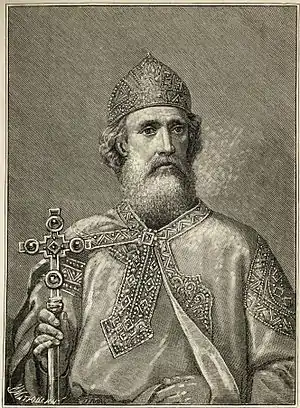980
Year 980 (CMLXXX) was a leap year starting on Thursday (link will display the full calendar) of the Julian calendar.
| Millennium: | 1st millennium |
|---|---|
| Centuries: | |
| Decades: | |
| Years: |
| 980 by topic |
|---|
| Leaders |
|
| Categories |
|
| Gregorian calendar | 980 CMLXXX |
| Ab urbe condita | 1733 |
| Armenian calendar | 429 ԹՎ ՆԻԹ |
| Assyrian calendar | 5730 |
| Balinese saka calendar | 901–902 |
| Bengali calendar | 387 |
| Berber calendar | 1930 |
| Buddhist calendar | 1524 |
| Burmese calendar | 342 |
| Byzantine calendar | 6488–6489 |
| Chinese calendar | 己卯年 (Earth Rabbit) 3676 or 3616 — to — 庚辰年 (Metal Dragon) 3677 or 3617 |
| Coptic calendar | 696–697 |
| Discordian calendar | 2146 |
| Ethiopian calendar | 972–973 |
| Hebrew calendar | 4740–4741 |
| Hindu calendars | |
| - Vikram Samvat | 1036–1037 |
| - Shaka Samvat | 901–902 |
| - Kali Yuga | 4080–4081 |
| Holocene calendar | 10980 |
| Iranian calendar | 358–359 |
| Islamic calendar | 369–370 |
| Japanese calendar | Tengen 3 (天元3年) |
| Javanese calendar | 881–882 |
| Julian calendar | 980 CMLXXX |
| Korean calendar | 3313 |
| Minguo calendar | 932 before ROC 民前932年 |
| Nanakshahi calendar | −488 |
| Seleucid era | 1291/1292 AG |
| Thai solar calendar | 1522–1523 |
| Tibetan calendar | 阴土兔年 (female Earth-Rabbit) 1106 or 725 or −47 — to — 阳金龙年 (male Iron-Dragon) 1107 or 726 or −46 |

Vladimir I (the Great) (c. 958–1015)
Events
Europe
- Peace is concluded between Emperor Otto II (the Red) and King Lothair III (or Lothair IV) at Margut, ending the Franco-German war of 978–980. Lothair renounces his claim on Lower Lorraine, while Otto promises to recognize Lothair's son Louis V as the rightful heir of the West Frankish Kingdom.
- June 11 – Vladimir I (the Great), grand prince of Kiev, consolidates the Kievan realm from modern Ukraine to the Baltic Sea. Vladimir is proclaimed ruler (knyaz) of all Kievan Rus'.
- Fall – Otto II sets off on his first expedition to Italy. He leaves the government in the hands of Archchancellor Willigis. Otto is accompanied by his wife, Empress Theophanu.[1]
- Winter – Otto II celebrates Christmas with his family at Ravenna. He receives the Iron Crown of Lombardy as the King of Italy.
- King Harald Bluetooth orders the construction of the Viking ring fortress of Trelleborg (modern Denmark).
England
- Viking raids from Scandinavia threaten the southern English coast after a pause of 25 years. Hampshire and the Isle of Thanet are ravaged.
Arabian Empire
- The Dari dialect (which will become the major language of Persia) is developed in the royal courts of the Samanid Empire in Central Asia.
Africa
Religion
- Notker (or Notger), Frankish Benedictine monk and bishop, founds the Prince-Bishopric of Liège (modern Belgium) which will remain an independent state inside the Holy Roman Empire for more than 800 years.
Births
- July 5 – Mokjong, king of Goryeo (Korea) (d. 1009)
- July 15 – Ichijō, emperor of Japan (d. 1011)
- Abu Mansur al-Baghdadi, Persian scholar (d. 1037)
- Abu 'Ubayd al-Juzjani, Persian physician (d. 1070)
- Adalbero, German nobleman (approximate date)
- Avicenna, Persian polymath (approximate date)
- Baldwin IV (the Bearded), French nobleman (d. 1035)
- Bardo, German abbot and archbishop (approximate date)
- Benedict VIII, pope of the Catholic Church (d. 1024)
- Einar Thambarskelfir, Norwegian nobleman (d. 1050)
- Ekkehard IV, Swiss chronicler (approximate date)
- Farrukhi Sistani, Persian poet (approximate date)
- Geoffrey I, French nobleman (d. 1008)
- Herman I, German nobleman (approximate date)
- Humbert I, founder of the House of Savoy (approximate date)
- Pope Nicholas II, pope of the Catholic Church (d. 1061)
- Olof Skötkonung, king of Sweden (approximate date)
- Otto III, Holy Roman Emperor (d. 1002)
- Sviatopolk I, Grand Prince of Kiev (approximate date)
- Tancred of Hauteville, Norman nobleman (d. 1041)
- Theodora Porphyrogenita, Byzantine empress (d. 1056)
- Xuedou Chongxian, Chinese Buddhist monk (d. 1052)
Deaths
- February 15 – Berthold, German nobleman (approximate date)
- September 28 – Minamoto no Hiromasa, Japanese nobleman (b. 918)
- Dado (or Dodon), Italian nobleman (approximate date)
- Domnall ua Néill (or Donal O'Neill), High King of Ireland
- Eoghan Ua Cathain, abbot of Clonfert (Ireland)
- Gunnhild, Norwegian Viking queen (approximate date)
- Ibn Khalawayh, Persian scholar and grammar (or 981)
- Liu Chang, emperor of Southern Han (b. 942)
- Yaropolk I, Grand Prince of Kiev (approximate date)
References
- Reuter, Timothy (1999). The New Cambridge Medieval History, Volume III, p. 254. ISBN 978-0-521-36447-8.
- James Hastings (2003). Encyclopedia of Religion and Ethics - Part 24, p. 847 (Kessinger Publishing).
This article is issued from Wikipedia. The text is licensed under Creative Commons - Attribution - Sharealike. Additional terms may apply for the media files.